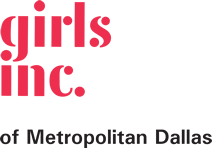Health and Safety
Empowered & Research Based Programs
Age-appropriate programs promote good, lifelong health habits. Girls Inc. complements the parental role by reinforcing the importance of preventing adolescent pregnancy, growing up drug-free and preventing sexually transmitted diseases.
Girls Inc. Preventing Adolescent Pregnancy
Helps girls ages 9 to 18 identify ways and reasons to avoid early pregnancy. The researched and evaluated program foster girls' communication skills as well as their motivation and resources for being in charge of their sexual health and avoiding teen pregnancy. The program provides basic health education and encourages girls to plan for the future through four age-appropriate components:
Growing Together
For Girls Ages 9 - 11 & a Parent/Adult
Parents are the primary sexual educators for children ages 9-11, yet most fathers and mothers never discuss sex with their children. Growing Together workshops bring girls together with their fathers, mothers and/or guardian in interactive sessions that jump-start crucial, two-way conversations about sexuality issues, physical development, family and personal values. Girls learn along with a parent or guardian:
- To be proud of the body they were born to have
- Personal values and beliefs
- Importance of communication, especially during family conflict
- Female health and hygiene
- Female anatomy and physiology
- Sexuality is a normal part of being human
- Understanding their bodies gives them power
- Their bodies communicate feelings
- Will Power/Won't Power
Will Power/Won't Power
For Girls Ages 12-14
This component of Preventing Adolescent Pregnancy explains to girls the facts and helps them build assertiveness skills so they are able to say "NO" as they enter the most pressure-sensitive adolescent years. Girls learn:
- About the reproductive system
- Myths and facts about sexuality
- The different types of relationships
- Romantic relationships can be unhealthy
- Assertiveness skills
- To recognize and resist negative peer pressure
- To avoid risky dating situations
- Values and how they apply to sexual behavior
- To recognize and resist sexual messages in the media
- Abstinence can be a positive choice
- Having sexual intercourse at an early age can cause reproductive health problems
- How to say "no" to intercourse
- About sexually transmitted diseases and HIV infection
- The power of a positive-sister support system
Taking Care of Business
For Girls Ages 15-18
Research has established that teenagers with serious education and career goals are less likely to become pregnant or give birth than those with low aspirations. In the Taking Care of Business sessions girls plan for the future, consider the professional opportunities that are open to them, the steps they need to take to achieve career goals and the impact that teen childbearing would have on reaching these goals. Girls learn:
- About female health and hygiene
- Female anatomy and physiology
- About personal values and beliefs and how they apply to sexual behavior
- Sexuality is a normal part of human life
- Myths and facts about sexuality
- How to say "no" to sexual intercourse
- Benefits of choosing abstinence
- About risks of HIV/AIDS and STD's
- Different methods of contraception
Health Bridge
For Girls Ages 12-18
The primary goal of Health Bridge is to link girls to community health-care professionals and services. Girls are helped to feel more comfortable using community-based health services throughout their teenage years.
Friendly PEERsuasion
For Girls 11-14
This component builds girls' skills for resisting pressure to use harmful substances such as alcohol, tobacco, household chemicals and other drugs. The two-part substance abuse prevention program teaches girls healthy ways to manage stress and confront peer, media and other pressures. The girls then assume roles as PEERsuaders for younger girls.
How Girls Can Help Each Other
A successful prevention effort must start early. In a national study, 69 percent of ninth graders had used cigarettes and 74 percent had used alcohol (39 percent by age 13). The Girls Incorporated two-part program trains girls ages 11-14 to advocate for themselves and teaches them how to serve as role models for those who are younger.
PART I
Girls ages 11 through 14 learn decision-making, assertiveness, and communication skills, which include practicing how to walk away from situations where they feel pressured to use alcohol or drugs. Through games, group discussions, and role plays, girls learn about the short-term and long-term effects of substance abuse, begin to recognize media and peer pressure to use drugs, and experience better ways to manage stress.
PART II
The newly trained "PEERsuaders" plan substance-abuse prevention activities for groups of children ages 6 through 10. Looked up to as leaders, the older girls' commitment to stay drug- and alcohol-free is reinforced.
